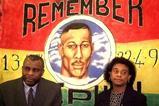Some of Charlie Kirk’s opinions seemed incongruous with those of the saviour he followed, says Richard Reddie

I was in Jamaica when I heard about the death of Charlie Kirk. I was scrolling through social media while sitting on my father’s verandah when I came across an apparent ‘live’ feed showing the graphic nature of the shooting. My first reaction was to assume it was an AI-generated hoax. However, a little later I received a BBC notification that Kirk had died.
My immediate thoughts went out to his family and friends, who had lost a loved one in such a brutal manner. Equally, I considered all those who had witnessed the shooting and would no doubt be traumatised by it.
His demise was a terrible symptom of the gun-related violence that has plagued the USA for far too long.
I must confess that I was never perturbed by Kirk’s trenchant views, which mirrored a plethora of his US counterparts down the decades (most of whom are now regarded as reactionaries). What really concerned me was that he described himself as a Christian, yet his so many of his opinions appeared incongruous with those of the saviour he followed.
Love and power
When I first became a Christian, I was given a copy of John’s Gospel, and what struck me most about this book was the way love permeated it. In John’s Gospel we read about God’s love for humanity (John 3:16), and Jesus’ love for us (John 13:33). Love is the golden thread throughout and undoubtedly the primary characteristic of being a Christian.
Indeed, Jesus says that “everyone will know that [we] are his disciples, if [we] love one another” (John 13:34). And in 1 Corinthians 13, we read the apostle Paul’s amazing treatise on love, and how it trumps every other quality or virtue.
There is too much heat and not enough light in so many of our conversations today
Maybe Kirk’s acolytes regarded him as a latter-day Old Testament prophet, discharging jeremiads to a fallen society. However, unlike many of those prophets - as well as Jesus and John the Baptist - who reserved their righteous anger for those in authority, Kirk was the friend of the potent. He even considered the most powerful person in the world, the US President, to be a close friend.
Sadly, Kirk used his considerable influence to largely upbraid minorities and the marginalised.
Racial justice
As someone who takes a real interest in racial justice, I have long been cognisant of Kirk’s views on African Americans and race.
He infamously suggested that the African American family unit was more cohesive prior to the civil rights movement and gaining the vote. (Kirk neglected to mention that this era was characterised by state-sponsored racial segregation, the mass lynchings of Black folks by White terrorist groups such as the Ku Klux Klan, and virulent racism, which included the bombing of Black churches.)
Love is undoubtedly the primary characteristic of being a Christian
He was also dismissive of the proficiencies of African Americans, especially women, arguing that they obtained roles as a result of wrong-headed ‘affirmative action’ and Equality, Diversity and Inclusion (EDI) policies.
Equally, he had some choice words about the many centuries of African American enslavement - a practice now regarded as America’s ‘original sin’. It is instructive that many of those who owned and brutalised their enslaved Africans were Christians, who regarded their slaves as ‘subhuman’, and not made in the image of God. Most rational people now condemn this behaviour and query the beliefs of these slave-owning ‘Christians’, questioning how they got it so wrong.
Will history look back on Kirk, and those who sympathised with some of his views, with similar sentiments?
Divided we fall
I say this as a Rev Dr Martin Luther King Jr aficionado. Akin to Kirk, Dr King met an untimely death via an assassin’s bullet. I am the first to admit that Dr King was no saint in life, but his momentous “I Have a Dream” speech illuminated his vision of love, unity and peace.
Dr King’s dream sought to reconcile Americans – and evade a possible racial Armageddon. Having examined Kirk’s diatribes, I would argue that his message was the opposite - aimed at people who invariably looked like him, and ultimately divisive.
Finally, I would also argue that there is too much heat and not enough light in so many of our conversations today. I considered Kirk to be a source of this heat; an incendiary-like emissary whose fiery rhetoric fanned the anger, anxiety, fear and distrust of his adherents, many of whom were young and impressionable.
Conversely, in John’s Gospel, Jesus is described as the “light of the world” – a beacon of hope who drives out fear, dispels hate and dissolves division. As Christians, we need to coalesce around those who preach this message. It is the only one that can bring true healing and reconciliation to our wounded world.
For an alternative view on Charlie Kirk, see Billy Hallowell’s article here






































14 Readers' comments